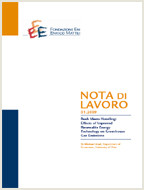Endogenous Participation in a Partial Climate Agreement with Open Entry: A Numerical Assessment

04.06.2013
Fabio Sferra, Massimo Tavoni
C72 , F18, Q54
International Environmental Agreements, Non-Binding Targets, Voluntary Climate Change Actions, Optimal Mitigation Strategies, Fair Burden Sharing in Climate Negotiations, Carbon Leakage
Climate Change and Sustainable Development
Carlo Carraro
Our purpose is to analyse the effectiveness and efficiency of a Partial Climate Agreement with open entry under a non-cooperative Nash-Equilibrium framework. We evaluate a partial agreement policy in which non-signatory countries can decide to join or to leave a coalition of the willing at any point in time. By means of a simple analytical model and of a numerical integrated assessment model, we assess different coalition structures, and different minimum admission requirements. Our results indicate that a Partial Climate Agreement with open entry can be effective, achieving climate stabilization between 2C and 3C depending on the composition of the coalition of the willing. The policy turns out to be also rather efficient, with only minor losses with respect to a full cooperation agreement. Finally, we quantify the optimal admission requirement in about 40-50% of cumulative abatement.
